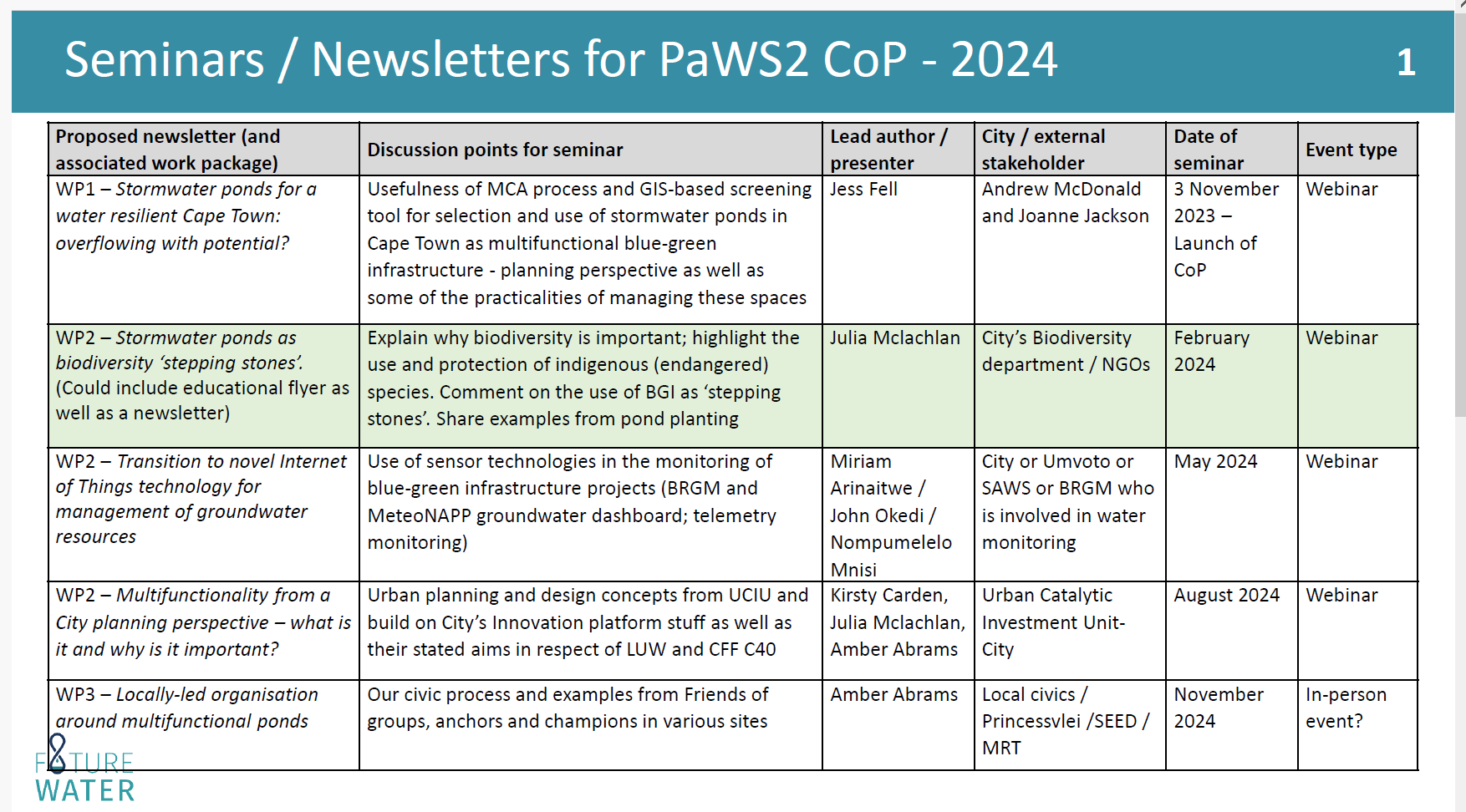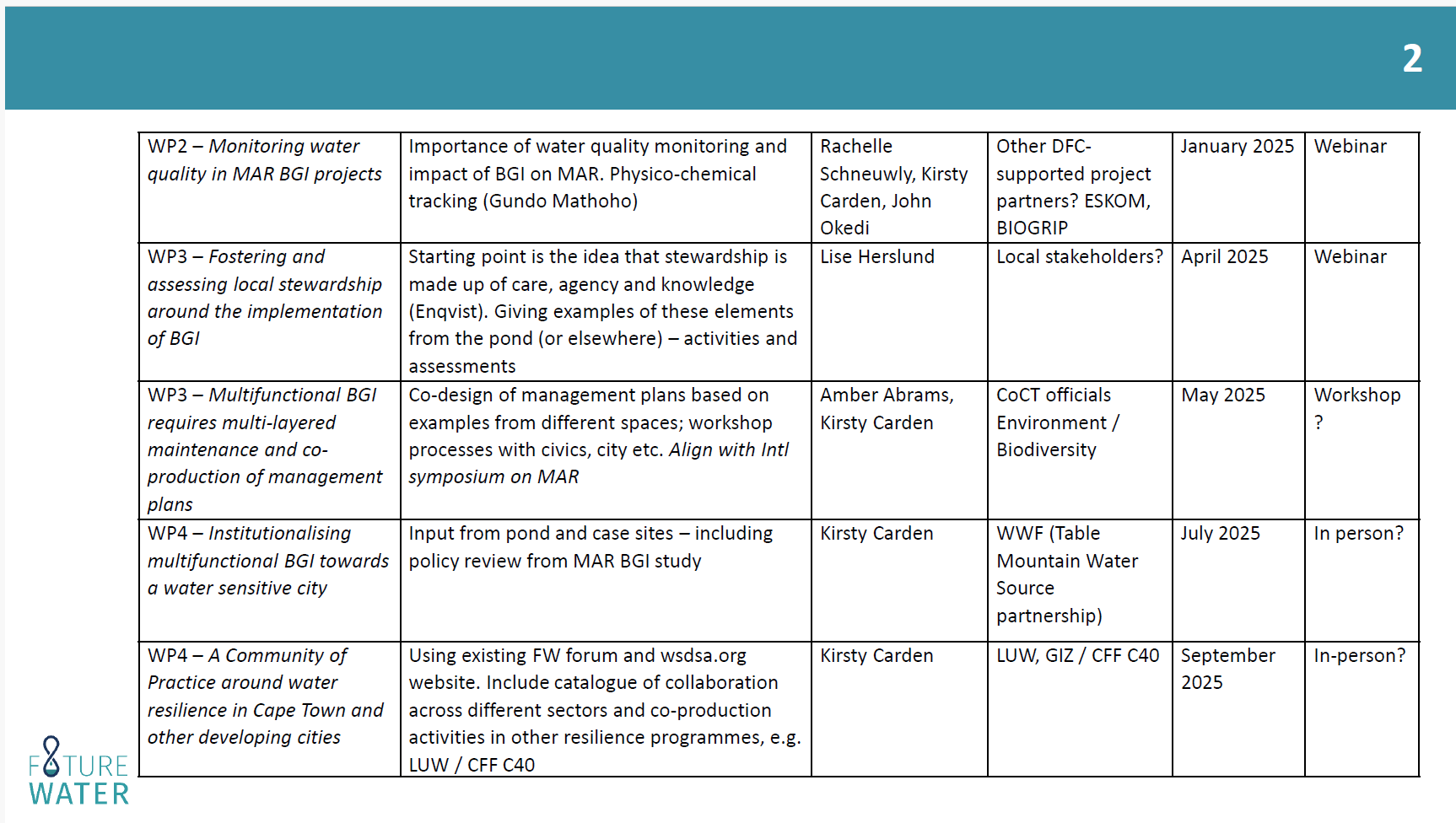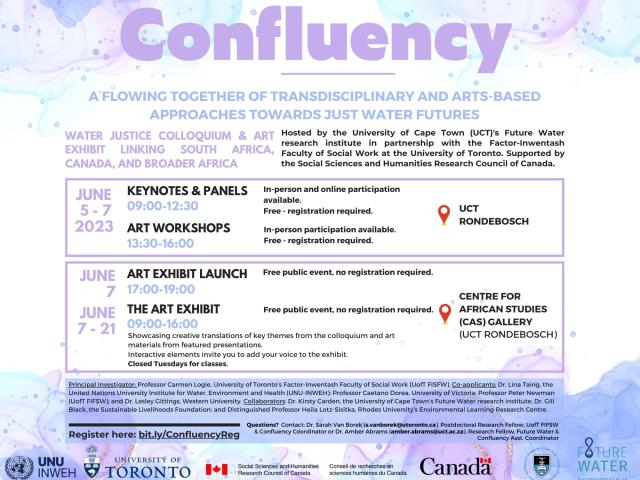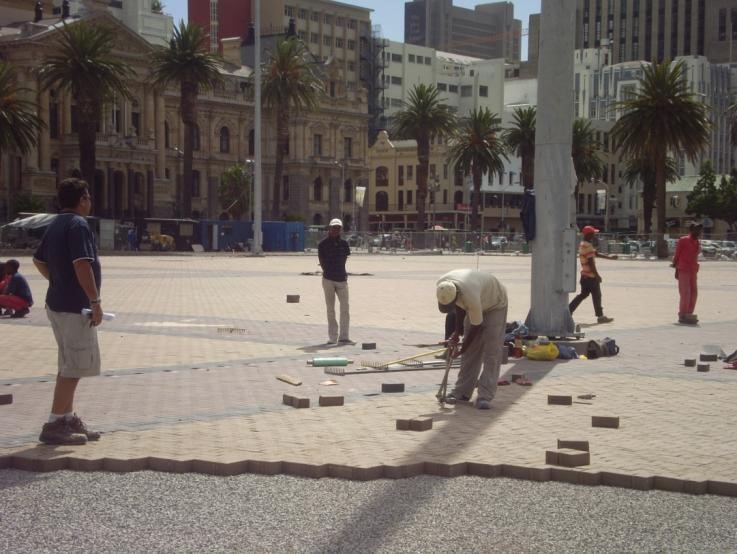Future Water runs a bi-monthly (every other week) seminar series that offers researchers, students and the public opportunities to learn about ongoing research, collaborations, proposals, etc., related in some way to water. The seminar is most often held on alternating Tuesdays during term from 1 - 2pm in the Snape Board Room, 4th Level, NEB (upper campus), however this is not always the case and it is best to sign up to the seminar list to keep updated on dates, locations and offerings. If you would like to sign up to be on the seminar series email list, or if you have research you would like to present please contact Dr. Sithabile Hlahla <sithabile.hlahla@uct.ac.za> and ask her to add you to the seminar list, or liaise with her about your presentation topic and timing.
More information, presentations and materials on some of our past seminars can be found here.
The Pathways to Water resilient South African cities II (PaWS2) project will be hosting a community of practice webinar series for the next two years. Launched in November 2023 this webinar series will be released alongside newsletters. A draft schedule is available here, and materials related to webinars that have taken place can be found here.


WATER JUSTICE COLLOQUIUM & ART EXHIBIT
Hosted by the University of Cape Town (UCT)'s Future Water research institute in partnership with the Factor-Inwentash Faculty of Social Work at the University of Toronto.
Supported by the Social Sciences and Humanities Research Council of Canada.
Register here or download the flyer here. To read more about the event, visit the event page here.

(2021) WESTalks Seminar Series
FW participated in the WESTalks Seminar Series. FW's Prof Dyllon Randall gave a presentation titled "Urine – the Liquid Gold of Wastewater", on 26 February 2021.
WESTalks Seminar Series is oganised by the India-Canada Centre for Innovative Multidisciplinary Partnerships to Accelerate Community Transformation and Sustainability (IC-IMPACTS) Student Engagement Committee (SEC), the University of British Columbia’s Future Waters, and McGill University. The seminars are an opportunity for researcher’s working on water research to share insights about their research. For more presentations during the WESTalk seminar series visit IC-IMPACTS's YouTube page
(2019) Permeable Interlocking Concrete Pavers Seminars

PICP are an increasingly popular solution for managing stormwater in urban areas as they don’t take up any space. Although they have been successfully used the world over for this purpose, many of the existing installations in South Africa are failing – possibly due to lack of proper environmental control and maintenance. Bio-cells offer a similar solution to PICP – taking up some space but with less risk of failure than PICP.
These seminars considered best practice for the design, construction, operation and maintenance of PICP and bio-retention cells in South Africa drawing on extensive use of both devices in the USA.
See Neil’s presentation on PICP & Biofilters, and Ryan’s presentation on Bioretention Cell Performance, Construction, and Maintenance.
(2019) Floating Seminar(s)
In August 2019, Dr. Amber Abrams, visiting scholar at Aarhus University through DANIDA mobility funding, hosted with Dr. Josh Cohen a floating seminar on Aarhus A. As a way to engage others who were not involved in this pilot, we have developed a photo-essay/invitation to think with us in this way (see here). This pilot experiment in learning, experiencing, and floating together was supposed to have a follow-up seminar in Cape Town in March 2020, however, this has been delayed due to Covid 19 restrictions." See here.
Regenerative Water Futures was the focus of this symposium
(2018) Bridging Waters Conversation Series
In late 2017 and through 2018, THE FUTURE WATER INSTITUTE held the Bridging Waters Conversation Series, where we talked about water sensitivity in a transdisciplinary way.
Below is a list of what each conversation focused on:
- October 2018: Cape Town as a Sponge City: what would it look like? A detailed visual dream of potential interventions at various scales.
- August 2018: What is a catchment? Do civil engineers, estuarine managers, ecologists, urban planners and other specialists view catchments differently?
- April 2018: Creating a water sensitive culture: the psychology of water-related behaviour change, including enjoyment.
- June 2018: The economics of water-sensitive design.
- February 2018: The importance of trees in liveable cities.
- September 2017: What does water mean to landscape architects?
(2017) Future Water Research Symposium
In July 2017 THE FUTURE WATER INSTITUTE held a research symposium that focused on “Equity and efficiency in allocating water in South Africa: challenging attitudes, changing behaviours”. Read about some of the reflections of the symposium round table discussions, as well as the lessons learnt from the event.
Symposium presentations
- Welcome (Sue Harrison, THE FUTURE WATER INSTITUTE)
- Introduction (Alison Lewis, Dean of Engineering and the Built Environment)
- Equity and justice around water (Loretta Feris, DVC: Transformation)
- The role of Future Water as an interdisciplinary research institute at UCT (Kirsty Carden, THE FUTURE WATER INSTITUTE)
- The River Multiple: ontologies of fluid relationships with water (Nikiwe Solomon, African Centre for a Green Economy)
- Behavioural interventions for saving water: experimental evidence from the City of Cape Town (Martine Visser, School of Economics)
- Do toilets and the internet have anything in common? (Ulrike Rivett, Information Systems)
- Water affordability and equity: assessing the invisible burdens for the poor (Horman Chitonge, Centre for African Studies)
- Life after mining – a brighter future (Vicki Shaw, Mine Water Coordinating Body, hosted by Nepad Business Foundation)
- Overcoming water scarcity for good? Querying the adoption of desalination technology in the Knysna Local Municipality (Suraya Scheba, Environmental and Geographical Science)
Round table discussions
- Creating liveable neighbourhoods (Tom Sanya, Architecture & Planning)
- Resource recovery: value to community, or environmental protection? (Bernelle Verster, Chemical Engineering)
- Practical ways in which businesses can reduce their water demand (Neil Armitage, Civil Engineering)
- What is the minimum amount of water needed to keep the city green and appealing to tourists and investors alike? (Kirsty Carden, Civil Engineering)
- Changing the tipping point: trading off the need to save with the need to perform (Tony Colman)
- Basins of the future: keeping rivers flowing (Kevin Winter, THE FUTURE WATER INSTITUTE)
- Repurposing water: fit for what purpose? (Sue Harrison, THE FUTURE WATER INSTITUTE)